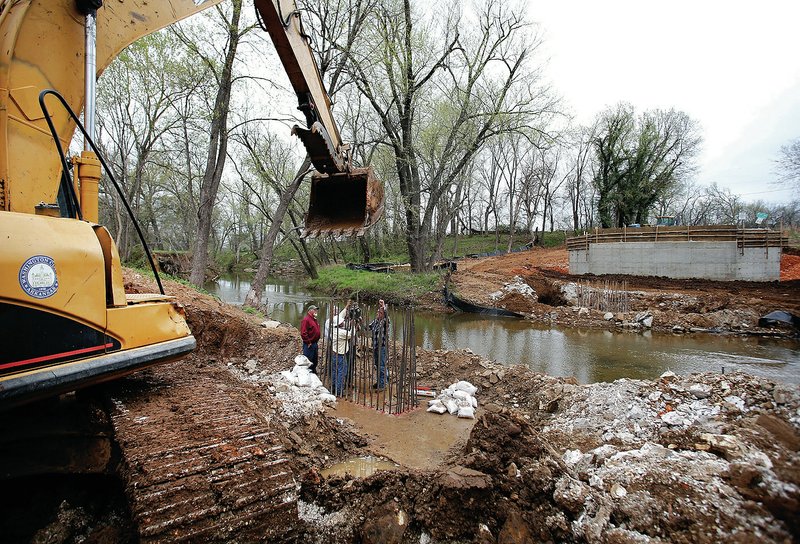FAYETTEVILLE -- Washington County investigators delivered a litany of reasons behind faulty construction of at least two county bridges, but they came back again and again to an overarching idea they heard from county employees: The county can build a bridge however it wants.
"You get to that attitude of 'we're the county, we can do what we want,'" Justice of the Peace Eva Madison said Tuesday while delivering the results of an investigation into the Harvey Dowell and Stonewall bridges she conducted with Assessor Russell Hill and private engineer Carl Gales.
She emphasized workers didn't act maliciously and wanted to do good work for the county. The mentality contributed to what she said was a casual disregard of an engineer's designs and instructions that could mean quicker deterioration for bridges that each cost more than $400,000 in materials and a year or so of work.
The county's assistant road superintendent, Shawn Shrum, has said the county can build how it wishes. He said Friday his comments had been taken out of context in the county report and in the media, leaving out nuance and qualifiers.
Governments at any level own the bridges they build and are responsible for them, Shrum said.
"Obviously the states or the counties or the cities are going to build them to withstand," he said, pointing to several counties around the state that use flat railroad cars as small, durable bridges because doing so is within their means. The state Highway and Transportation Department then inspects bridges for problems and suggests weight limits if needed.
None of that means "we can build however we want and there's nothing anybody can do about it," Shrum said.
A local bridge built with county money doesn't have to meet any legal minimum standards, said Danny Straessle, highway department spokesman.
Projects built with federal money, such as an interstate highway bridge, must meet federal standards, he said. The department largely mirrors those standards for its own projects as well, including the ongoing Woolsey Bridge project in south Washington County. The county asked for state involvement and help because of the bridge's scale.
"There's no cutting of corners or anything like that on our part," Straessle said.
A county bridge can come in any shape, Straessle said, but he echoed Shrum, saying the owner has full responsibility for whatever happens to the structure afterward.
"If an entity wants to put up something quick and dirty or cheap or whatever, they're able to do that. Then you've got accountability issues to your stakeholders, your constituents," he said. "Everybody wants to do the best they can."
Harvey Dowell bridge stands just outside southeast Fayetteville and opened in late 2013, while Stonewall is unfinished near Prairie Grove.
Their construction has come under intense scrutiny in the past several months. George Braswell, a Road Department employee, first raised public concerns about the bridges in a lawsuit against county officials claiming he was punished for pointing out their problems.
A video released in the lawsuit in March appeared to support Braswell's claims about the construction. County Judge Marilyn Edwards then ordered Stonewall to be redone and placed a 3-ton weight limit on Harvey Dowell at the advice of the engineer, Jim Beatty.
Madison, Hill and Gales conducted the investigation to find the source and extent of the issues with the bridges. Department culture and poor management and training all fed the problems, the investigation found.
Work at Stonewall has halted, because several members of the Road Department's bridge crew have resigned, and the remaining workers won't go back to the job site, Edwards has said. After hearing the investigation results, she said she would review the report and come to a decision of what to do next. Edwards didn't return several phone calls and messages for comment Thursday and Friday.
State oversight of local bridges is limited to inspections every year or two years, Straessle said. Teams of two or more will conduct a "hands-on" inspection of the road deck, columns and walls.
"The inspectors are looking for signs of fatigue or cracking, bolts that may be worn out in older bridges," he said. "Depending upon how the bridge is constructed, you look for different signs of wearing out, basically."
Madison and the others said they found such signs of fatigue at both bridges, as well as at another on Bethel Blacktop Road west of Farmington. They provided photos of cracks, small gaps in the concrete called honeycombing, erosion and other issues.
The most recent state inspections for the Harvey Dowell and Bethel Blacktop bridges don't note such problems. Inspectors noted Harvey Dowell's beams were tight against the end walls, a concern for heat expansion, in its December 2013 inspection. In May 2014, inspectors alerted the county of flaking paint at Bethel Blacktop, according to letters Straessle provided. The bridge was also inspected last March.
The inspectors called the concerns routine and preventative, and both bridges were rated "good," indicating no significant deterioration.
The cracks and other issues could have appeared after the last inspections. Features that look "catastrophic" to a layperson also might not concern an inspector, Straessle said.
One man recently alerted the department that rebar was visible from the worn concrete of a Fort Smith bridge, for example. Inspectors took a look and said it was concerning mostly because the rebar could start to rust, and they recommended a simple concrete patch, Straessle said.
"Every bridge has something going on with it," he said, adding maintenance is constant work. 'You're not going to have a perfect structure out there."
The county should inspect its own bridges more often, Madison said Friday.
"Certainly the state inspections are helpful, but I don't know that we should be relying on that as our only inspection method," she said. "If you catch it early, it's less costly to fix it."
Dan Holtmeyer can be reached at [email protected] and on Twitter @NWADanH.
NW News on 05/11/2015


